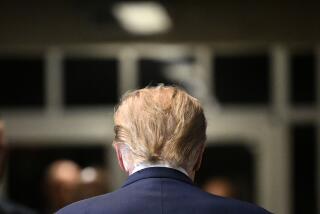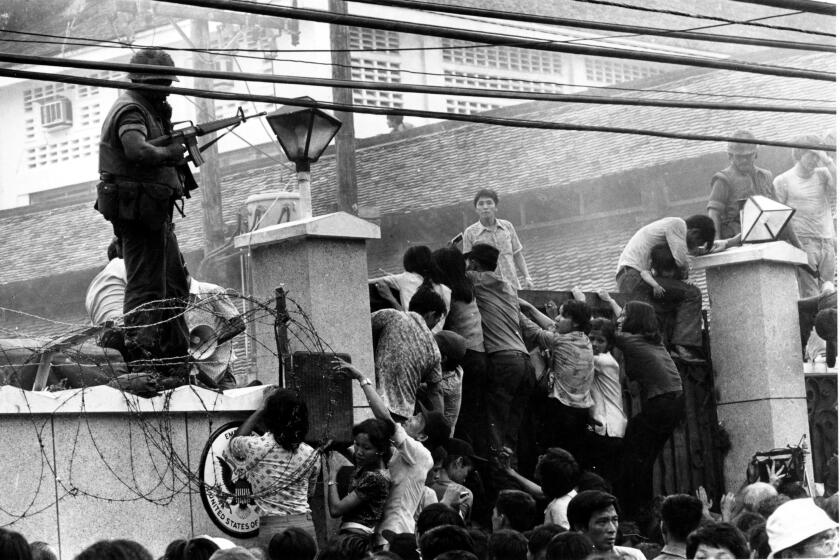Congress to consider how unions organize
Choose your weapon: cards or ballots?
It has become the central question in union organizing fights across the country: Will the employer recognize a union after a majority of its workers sign union cards? Or will the employer insist that its workers cast secret ballots in federally supervised elections?
These questions -- of paper and power -- move from the workplace to Congress this week, when the House is scheduled to cast the first vote in what could be a years-long legislative battle between the country’s largest labor unions and most powerful business lobbies.
The stakes: deciding the manner in which Americans join unions.
The proposed Employee Free Choice Act would take from employers the right to decide whether to accept the signing of cards -- generally called “card check” -- or demand an election. Instead, a workplace could unionize if labor persuaded a majority of employees to sign cards -- without an election of all employees.
“We’re not free to organize the way we want to organize,” said Glendale Hilton bartender Angela Reid, who has been active in union organizing at the hotel.
“We don’t want to do an election. We want to vote the way we want to -- give our cards back to our organizers and vote that way.”
Reversed roles
For both sides, the battle represents something of a role reversal and offers a window on the important but odd details of labor law.
Unions and their political allies, which for 70 years championed the secret ballot for unionizing workers, are all but abandoning the election process, arguing that aggressive anti-union tactics by businesses make such elections too difficult and costly.
And business leaders, generally hostile to any government intervention in their companies, are preparing to spend millions to defend federal supervision of elections in which workers choose whether to unionize.
Without a vote, said Joe Herman, a lawyer who has long represented employers, “employees would lose their free choice on whether or not to become unionized.”
“It’s incredible verbal jujitsu to call this Employee Free Choice,” Herman said. “It’s Orwellian.”
The House is expected to approve the legislation as soon as Thursday, but Senate prospects are less certain.
Even if the bill passes Congress, President Bush has pledged to veto it.
Labor leaders expect defeat this year but say theirs is a years-long strategy, designed to educate the public on the problems of secret ballots.
‘That’s the crunch’
Unions say that without a change in how workers join unions, the percentage of union-represented workers -- fewer than 10% in the private sector -- will continue its decline.
Through natural attrition and changes in the economy, labor loses about 500,000 members a year, said labor historian David Brody, a professor emeritus at UC Davis. Under secret ballots, the union movement produces fewer than 100,000 new members a year.
“They need a new process,” Brody said. “That’s the crunch right there.”
Secret ballots were part of the National Labor Relations Act, passed in 1935. Advocates saw elections as a way to give workers a choice between “company unions,” created by management, and more independent and adversarial unions.
The signing of union cards also has long been an integral part of how people join unions. Under the current law, unions organize by having workers sign cards. Some employers agree that if the cards are independently checked by a third party -- a card check -- they will automatically recognize the union without a secret ballot.
But under the law, employers can and often do insist on a secret ballot, which must be supervised by the federal National Labor Relations Board. If a majority votes to join the union, collective bargaining is supposed to begin.
Unions win three out of every five such elections, according to the board. But dozens of studies by labor, academic researchers and human rights groups have found that the rules for such elections favor employers.
Most companies faced with organizing campaigns hire consultants or lawyers who specialize in “union avoidance.” By one estimate, the business of battling union organizing is a $4-billion industry.
Unions allege systematic attempts by companies to fire, discipline or intimidate workers who support a union. The balance of labor complaints about the election process focus on delays. Even when unions win, some companies delay contract talks or refuse to bargain collectively.
In response, many unions have tried to avoid elections. Before submitting signed union cards, they build campaigns to push employers to sign “card-check neutrality” deals to recognize the union without an election.
Such campaigns have been successful in Los Angeles. Security officers in office buildings around Los Angeles County are being organized under a neutrality agreement between Service Employees International Union, building owners and security contractors.
The most prominent ongoing labor dispute in Southern California -- over a unionization drive at hotels near Los Angeles International Airport -- is about a card check. The union seeking to organize, Unite Here, is demanding that hotels agree to a card check. The hotels want their workers to have a secret ballot.
Asked about the effect on hotel workers, Maria Elena Durazo, head of the Los Angeles County Federation of Labor, said, “I’m confident that if the Employee Free Choice were law, workers on Century Boulevard would now have better wages, family health insurance and a pension through a union contract.”
Making their case
The nation’s leading business lobbies and trade associations counter that problems with the system are relatively rare. More than 90% of secret ballots take place within 57 days.
Businesses have hired top political consultants for a campaign that portrays unions as hostile to democracy.
Congressional Republicans say that under a card check, some workers could see their workplace unionized without having a say.
They also suggest that their Democratic colleagues, some of whom previously supported secret ballots, have been intimidated by labor political power into supporting the Employee Free Choice measure.
Opponents of the legislation have circulated letters in which bill supporters -- writing in the past in other contexts -- have demanded secret ballot elections.
“I wish members of Congress could vote secret ballot when it comes to union issues,” said Sen. Jim DeMint (R-S.C.), “because a whole lot of intimidation goes on.”
More to Read
Get the L.A. Times Politics newsletter
Deeply reported insights into legislation, politics and policy from Sacramento, Washington and beyond. In your inbox three times per week.
You may occasionally receive promotional content from the Los Angeles Times.






